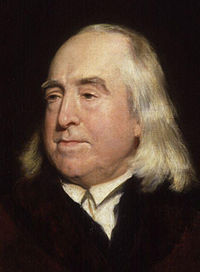
Photo from wikipedia
ABSTRACT Bentham's thought cannot be reduced to the usual oppositions between ‘natural freedom’ and government interference. For Bentham, freedom in a political society is determined by the existence of a… Click to show full abstract
ABSTRACT Bentham's thought cannot be reduced to the usual oppositions between ‘natural freedom’ and government interference. For Bentham, freedom in a political society is determined by the existence of a legal system that creates obligations for some people and rights for others. The government's task does not directly consist in respecting a sacred natural right, but aims at producing the ‘arrangements’ that are to direct the interests of the greatest number towards beneficial goals for the community as a whole. The legislator is to know, form and guide the individual interests. For this purpose, he has to summon public opinion in order to control individual action. On this point, we should reiterate, contrary to what Michel Foucault contended, that the main form of power in modern society is not exerted by a central state, but by each individual on others. That is the meaning of a very important idea in Bentham's theory, which appears in his writings on indirect legislation under the metaphor of the ‘invisible chain’. The habit of watching and judging others in the permanent Public Opinion Tribunal is the best way to learn self-discipline. Bentham's ideal is the self-government of individuals by the calculation of pleasures and pains.
Journal Title: History of European Ideas
Year Published: 2017
Link to full text (if available)
Share on Social Media: Sign Up to like & get
recommendations!